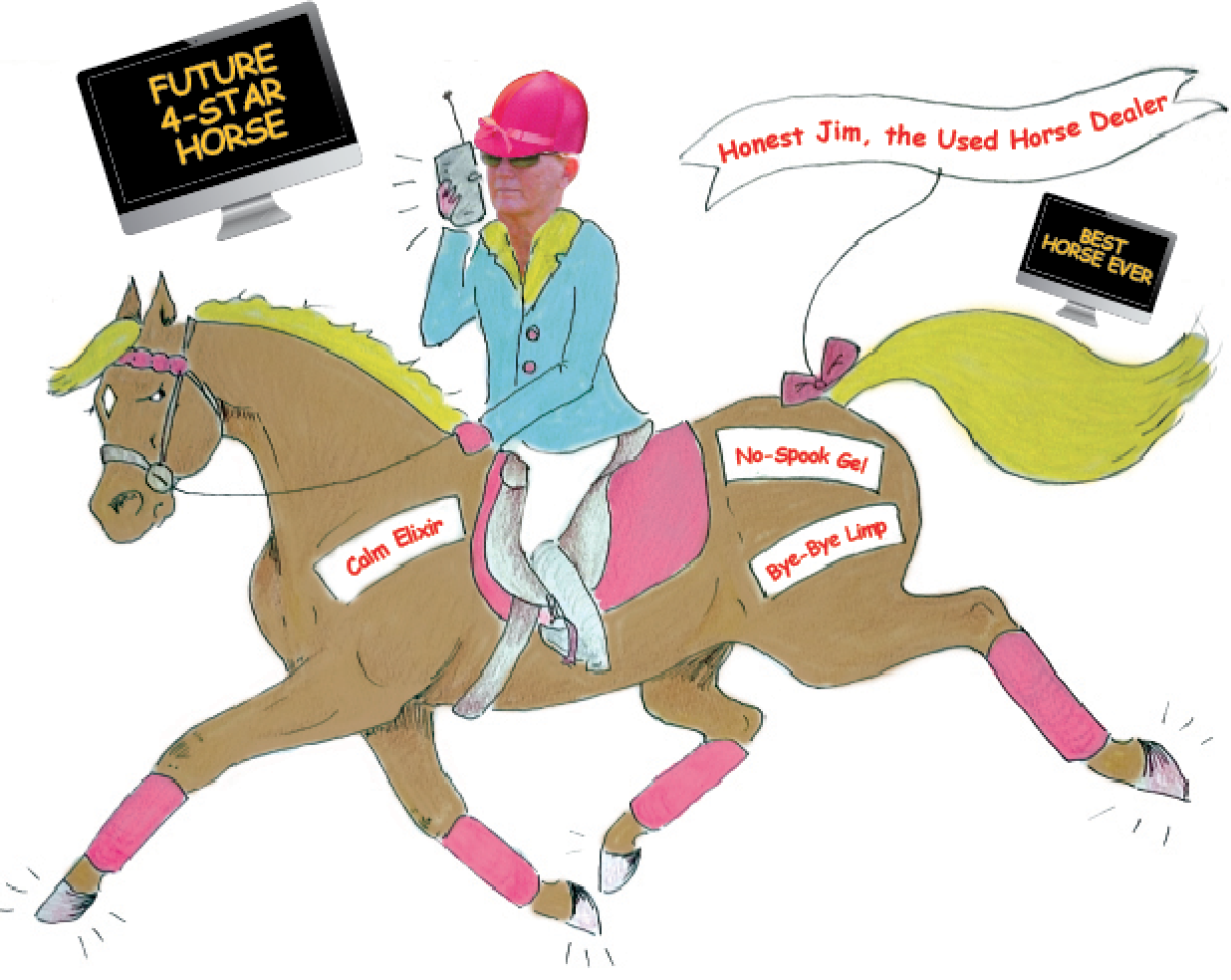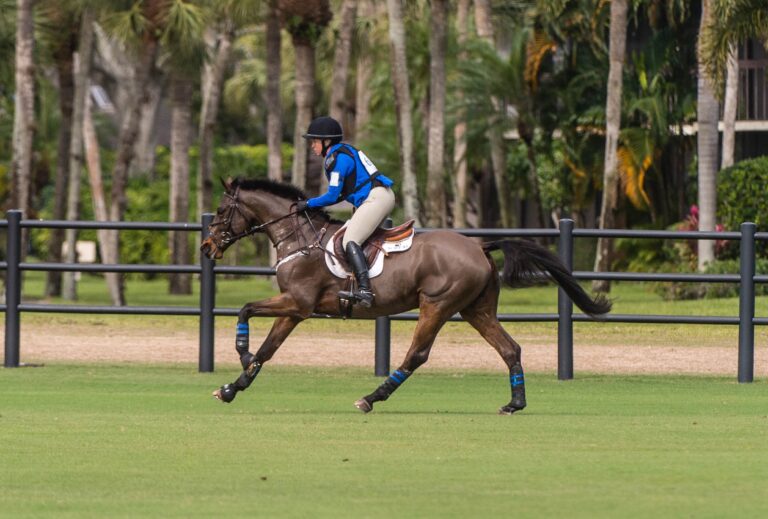
When I mentioned to a friend that lately I was out of sorts, he said something about the “Ides of March.” When I looked up the Ides, Google told me that it is March 15, best remembered for a seer’s unheeded warning to Julius Caesar before his assassination (at least according to Shakespeare). But there was a second definition: It’s “a seasonal tendency of saddle-tramp columnists to rant about various topics.”
“Ah,” I thought, “that’s why I have been unsettled lately. I need a good rant.” The competitive season has started again, which means plenty of opportunity for me to notice trends and to figure out why I am in a bad mood about them.
Blinded by Bling
Usually I start by talking about horses, but this is the age of the narcissist, so let’s talk about us, shall we? I mean, after all, it is all about us, isn’t it? It must be because riders seem to spend more time worrying about how they look than how their horses go. Let me share something with you: When you were 12, hot pink looked cute on you. Now? Not so much. Even on cloudy days, I have to wear sunglasses to keep from being blinded by the glare as some riders head for the arena. I see plastic stirrups in garish colors and spurs with fake diamonds (there’s irony for you). And don’t forget the riding boots (not shined, of course … why polish your boots when you can disguise the lack of elbow grease with three-color piping on your initials?). There’s not much space left on riders that isn’t covered with glitter, sparkle or something designed to disguise the fact that their horses aren’t going well.
The next thing we know, riders will have a computerized billboard built into the back of their riding jackets, flashing news about their sponsors’ latest “calming agent” and reminding you that they have just posted the cutest picture of their newest syndicates’ most recent purchase on their various social-media accounts. Some riders have obviously lost fitness last winter and aren’t too worried about getting it back. As well as small computer screens on their backs, they could have Jumbotrons on their, uh, backsides, with room enough on it to advertise “Bubba and Junior’s BBQ, Chattanooga, Tennessee.” And that would all be on one line, too.
Needed: Common Warm-up Courtesy
Narcissism is alive and well all over the place—for example, look in the warm-up areas. Last time I checked, a first-time competitor at Novice level pays the same entry fee as anybody else, so it’s a non-starter for a professional to monopolize one end of the dressage warm-up area to give his rider a lesson. Most of these “lessons” are really just self-promotion and at full volume, too. If the loudmouth in the corner knew how wrong he is about some of his bellowed instruction, he would pipe down. (I don’t bother correcting them—sounds like job security for me.) The louder the lesson, the more obvious it is that the rider and coach have not done the necessary work at home and are trying to make up for it in the last few minutes.
While some professionals have a secretly sneering attitude toward amateurs, I often think that amateurs are the best among us and deserving of respect. Kurt Anderson remarked in a 2009 essay in Time magazine that “amateur” was once an entirely positive adjective. “An amateur pursuit meant something—a field of study, an artistic enterprise, a craft—that one pursued, not unseriously, but out of love rather than merely to earn a living.” Amateurs deserve respect, not ridicule because they do not ride as well as a professional. I think of myself in the same category as a hot-dog stand at a competition: a useful addition, but not necessary. Famed poet Toni Morrison said, “You’ve been successful with your children when they don’t need you.” It’s the same with a professional’s students.
Before we leave the warm-up ring and while we are talking about respect, let’s talk about respecting the jumps in the warm-up. No, you can’t “reserve” a fence for a professional. And don’t tell me not to change the size of the obstacle, not when your “pro” is six away and my rider is next in the ring. (I put the “pro” in quotes … if she were a real pro, she would know better and have trained her jump crew better, too.) Our sport is not a support system for professionals who are training horses and riders; it is a sport where riders can have fun, compete with the animals they love and obtain a realistic evaluation of how much progress they have made in their training.
A quick aside (this is my rant, after all): I laugh when I hear professionals say that they need events to “train future international stars.” As I travel around the country, every ring I see has narrows, corners, bounces, liverpools, turning questions … all the toys. When some clever cross-country course designer comes up with a new wrinkle (putting the wedge before the piraña pit and the flaming hoop of fire rather than the other way around), you can be sure that a miniature version of that new cross-country question will pop up everywhere. Good trainers are introducing their horses to problems at home so that the competitions are no problem.
Saying (or Posting) Don’t Make It So
Thinking about competition results is my segue into the next part of my rant: social media. Regardless of how badly a horse goes at a competition, you wouldn’t know it from social media or the website of the rider involved. I don’t stalk these sites, but people occasionally send me the most egregious posts. Imagine my surprise when I read about “a future four-star horse who made it look easy.” (Obviously, I am omitting the names to protect the guilty.) That’s funny—I was at that competition and saw that horse and rider. They didn’t look like four-star material to me. The horse was obviously hanging on one rein in dressage and got the 58 percent he deserved. In the show-jumping phase he knocked down three rails—one of which was the rider’s fault, but the other two were because the horse has no conscience (or pain threshold) at all. And the rider had to give a pretty good imitation of a monkey making love to a porcupine to get the future four-star prospect around a nice, plain-vanilla cross-country course. I’m not sure how I would describe their round, but mine wouldn’t match the description on the rider’s website or Facebook page. Done well, eventing is a thing of grace and beauty. I hope they are home now and working on that because they are still short of the mark. Reading the various websites that cross my computer screen, I can’t decide if they are lying to us or truly don’t know they are not going well. Either possibility is worrisome for the future of the sport.
Beware …
And that’s my final rant about the future of our sport, the powers that be and their endless tinkering with eventing. My advice is just leave eventing alone. Quit changing and messing with it. I am as old school as anyone, but I don’t think eventing is perfect as it is nor was it perfect during the Classic era. Classic events now only exist here in the U.S. and (in spite of persistent eulogizing by a core of enthusiasts) they are gradually dying out. A Classic event these days is a little bit like a preacher’s heaven: Everyone talks about it, but no one wants to go. If riders don’t enter, we can’t blame organizers for dropping a Classic from their schedule.
Meanwhile, eventing in some form goes on. Riders continue to enjoy training and competing in multiple disciplines. There are sufficient levels of competition for everyone, and many organizers provide the opportunity for amateurs to compete among themselves rather than against more skilled professionals. At the same time, “open” classes allow riders to compete on an equal basis, regardless of their experience or category.
Shrewd observers have questioned recent changes to eventing, all in an attempt to keep horse sports in the Olympics. The results are difficult to accept now that the Olympics and World Championships are not even set at the elite (four-star) level and so don’t even represent the ultimate test for competitors. What’s the point? I wonder what our sport will look like in a few years when the International Olympic Committee decides that despite all our accommodations, there is no longer room in the Olympics for horse sports. My advice about the Olympics: Fehgeddahboudit. Fortunately, as long as there are horses, there will be riders who want to combine their efforts across disciplines and are not afraid of hard work. And while you work at it, do me a favor: Don’t wear bling, don’t lie to yourself or others about your current stage of training and make sure your efforts are worthy of your horses.
So that’s my rant. I hope somebody is listening. You know what Caesar said about the seer: “He is a dreamer, let us leave him.”
This article was originally published in the April 2017 issue of Practical Horseman.










